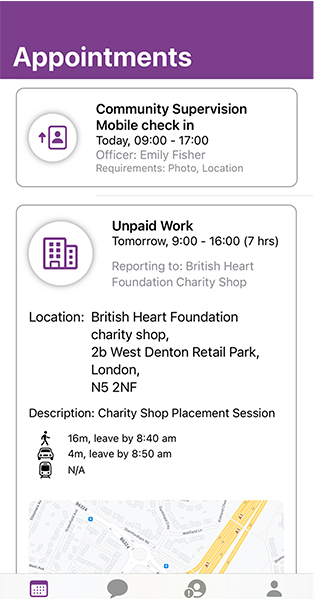Article
Francis Toye
In recent years the UK Probation Service has undergone a series of centrally driven policy changes designed to promote innovation in the sector. The Transforming Rehabilitation Programme (2015-2021) aimed to encourage greater innovation in the delivery of offender management by outsourcing some aspects of probation to private the private sector in the form of Community Rehabilitation Companies (CRCs). The idea was that this would enable the Probation Service to trial newer technologies leading to enhanced operations and more efficient, smarter ways of working.
At the time, research by Morris & Knight concluded that digitalisation of services offered the potential to strengthen people’s commitment to desistance proposing ‘to place service users as close to the centre of their design and implementation as possible’. Some of the CRCs adopted modern case management systems and experimented with mobile applications but in 2020, Ministers decided to return all probation work back in-house due to complications with the public / private split.
As the Probation Reform Programme begun the reunification of the Probation Service the Covid-19 pandemic arrived and changed the probation landscape overnight. Public services had to respond to the new regulations with no face-to-face contact unless absolutely necessary and remote supervision over mobile phones filled the gap.
This public health emergency served to crystallise the central view that mobile technology if, managed well, could be used to better support remote supervision. This was endorsed by research into practitioners’ experiences of remote supervision during the crisis, concluding that if managed well, there are clear benefits for the service user. Also, new technology and flexible ways of working give practitioners more options for managing busy workloads (Dominey et al 2018).

In Unilink’s experience, probation work is at its best when built around relationships and we have sought to adopt this as a key design principle. With this in mind, we have developed a new mobile application based on user research and academic evidence. The application design is framed around enhancing some key principles in desistance theory and augmenting probation supervision with a mobile application for people on probation. The aim is to improve the user experience, making the supervision process more collaborative, hopeful and engaged.
Our evidence-based approach places probation users at the centre of our design. It has been developed in a user-led, flexible way with probation staff and service users, so it meets the individual user and stakeholder needs we identified. The intention is to simplify and improve communication, add a new layer of connectedness to supervision and better support the service user in their journey towards desistance.
Our user research identified a number of pain points that probation users and practitioners expressed as the top issues we needed to address through key features in the application. The first of which, is to support the scheduling of appointments through a mobile application, allowing the person to receive and request appointments, rearrange clashes, providing proof for absences and the sending of reminders and digital documents for proof of absence. What seems like a relatively simple function is hugely significant in terms of building a sense of personal agency and autonomy for people on probation.
We are very excited about piloting the application with the Probation Service in early 2023. We anticipate these functions will help to deepen the probation relationship and provide the means for personal growth and transformation.
The regional pilot will be evaluated by the Probation Service, who will assess how digitising services for people on probation can best support them on their desistance journeys. These insights will guide future service design to improve blended supervision, delivery of Unpaid Work and how best to support those on Electronically Monitored Curfews.
References
Dominey, J et al. (2021) ‘Putting a face to a name: Telephone contact as part of a blended approach to probation supervision’ Probation Journal, 68(4), pp.394-410.

Francis Toye is Unilink’s Founder and CEO.
Helping Prisons and Probation Work: For Offenders, for Staff, for Society.
Unilink specialises in innovative solutions for criminal justice sectors around the world. Unilink’s reputation has been built on over twenty years’ experience in case management systems for probation, custodial management systems, biometric applications, offender self-service and communications. All Unilink’s solutions are created with the direct input of industry professionals and learnings from the 200+ establishments that use a Unilink product.
Independent research from the University of York shows that Unilink’s self-service software contributes significantly towards rehabilitation and running prisons efficiently.
The system is well proved and tested; offenders have carried out over two billion transactions. Unilink’s rich portfolio of proven solutions underpins digital transformation in prison and probation services across the UK, Norway, Austria, the Netherlands, Australia and New Zealand.
Unilink is a multi-award-winning company winning the Queen’s Award for Enterprise in Innovation and “Best Citizen App” and UK Digital Leader overall winner in recent years.



